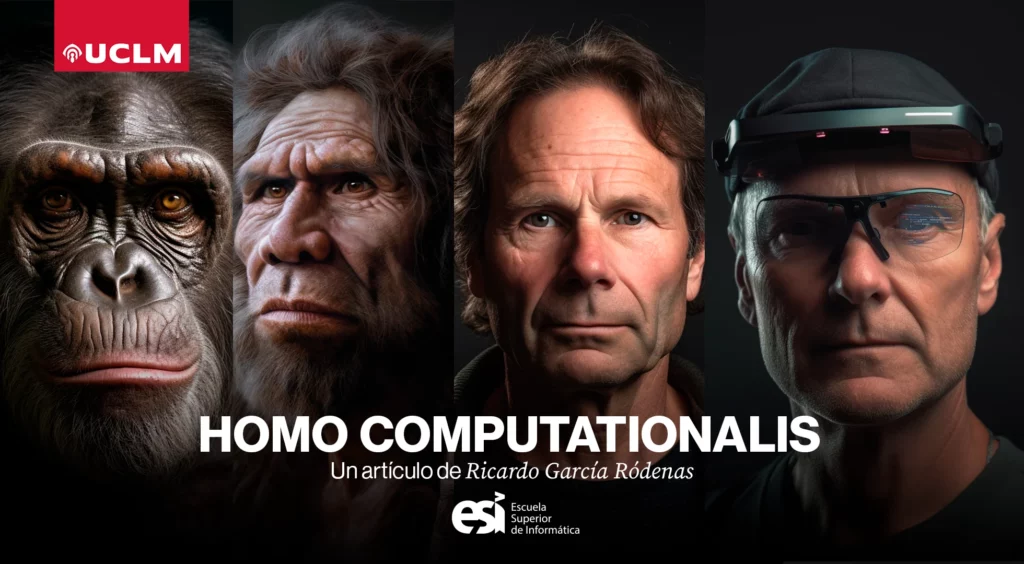homo computationalis
By Ricardo Garcia (University Professor)
One of the most heroic voyages in sailing was made by Ernest Shackleton and his crew. his boat, harden, it was trapped by the ice of Antarctica, which collapsed it, leaving the sailors on top of the ice. Shackleton led his crew to uninhabited Elephant Island and he and five other sailors would make a 1600-mile journey for help. The journey lasted 16 days until reaching the whaling station on the island of South Georgia. The navigation was carried out by sextant and the bad weather conditions only allowed the Captain to make three measurements, but his precision in his calculations led him to Elephant Island. The history of seafaring is littered with stories with unequal outcomes, where miscalculation, such as the radius of the Earth, jeopardized the survival of its crew.
The importance of computing in the history of humanity cannot be limited to micro-histories like the previous one, but rather it has played a central role and will continue to do so in human development. I am thinking of a broad concept of computational capacity and the title of the book by M.Arbib (1981) Brains, machines and mathematics. Its title is suitable for me to set the coordinates where to situate the concept, where artificial intelligence it is a part of this capacity.
Science allows us to understand the world and technology allows us to live in the world. Computational capacity is a transversal and essential skill in scientific and technological contexts. As a society we must prioritize it for several reasons.
In a finite world like ours, a growing economy is unfeasible. Donella H. Meadows et al. (1972) noted this fact in their report the limits of growth Commissioned by the Club of Rome. There is an illusion that makes us believe that the infinite problems will be solved by a science and technology that achieves more notable and incredible successes every day. These ideas are also promoted by lobbies and require critical thinking that can evaluate and draw its own conclusions. This is one of the qualities of computational ability. For example, if we want to question that technological changes are going to solve the problems derived from growth, we can analyze a specific example. Currently there is a belief that a change in the energy model in the automotive industry will take place, with the electric car being the natural replacement for combustion engines. If all the world's lithium production were dedicated to building batteries for electric cars, leaving mobile phones unattended, tablets, etc. fewer than 18 million vehicles would be produced. World production in 2022 was 85 million vehicles in total. The corollary is that we would need to produce more than four times as much lithium to maintain current conditions. Quantification decouples the problem from aspects of beliefs and apriorisms, and sheds light on the answer. It is an essential tool to improve critical ability.
There are multiple arguments to establish a future scenario where the scale of the economy is considerably much smaller than the current one (40% perhaps?) and regardless of the environmental political decisions that could be taken. In the convergence process there will be collisions with the limits of the Earth itself and give a correct answer of how much, where, when or how is once again essential for one's own supervivencia. It's a new journey in the harden and making the right decisions, in order not to be trapped in the ice again or to be able to reach South Georgia, will demand the best of computational capacities.
How can we equip ourselves as a society with this computational capacity? The answer varies from one country to another. The US is capable of attracting talent from around the globe and commanding the bulk of available resources. China trusts it to its own volume while the EU must promote and retain all its talent. In addition, the cooperation of agents competing for resources is not guaranteed. For example, if the US builds a quantum computer, it would never sell it to China (or the EU), in fact, all current scientific developments that make its construction possible include the same security measures as if it were military technology. The limits in this race also vary, for example, ethical issues in the development of artificial intelligence are less discussed in China and even in the US than those raised in the EU (Committee on the Internal Market and Consumer Protection, 2023).
If we situate ourselves on a local or regional scale, the degrees of freedom of the solution space to increase our computational capacity is drastically reduced. In addition, we must deal with the fact that on the margins of the margins these questions do not seem to appeal to us. Deciphering the structure of a protein or doing the necessary calculations in nanotechnology becomes other people's things, expensive and useless games for our daily problems. Some plausible actions are:
- We must understand the disruptive operation of scientific and technological advances. For example, in pharmacological research only a residual percentage of the active ingredients tested are of practical interest. But despite that, the return of that infinitesimal fraction is worth the entire investment. This same situation is present in science and technology in general. We must assume this operating rule and provide ample funding for research in this area. Also, unlink it from immediate or extremely final revenues.
- 1.4% of the active population is dedicated to agriculture in the EU and this economic activity generates approximately 1.5% of GDP, however, for historical and strategic reasons, 40% of the EU budget is dedicated to this sector. It has gone from 60% of the budget to 40% without a catastrophic impact, as a kind of replacement of flood irrigation by drip irrigation. In the same way, computational capacity must be understood as strategic and finance the creation of jobs in these sectors so that no talent in the EU territory is wasted due to lack of irrigation.
- Training is an essential lever for the development of this capacity. At the secondary education level, the inclusion of a programming subject in high school is necessary. In addition, mathematics programs are very extensive and are covered superficially, developing marked by the need to pass exams and leaving the development of mathematical skills in the background. At the university level there is an imbalance in technical training between the technology part and its fundamentals. Priority is given to generating a workforce for the industry over the development of knowledge.
The development of computing power will provide solutions to some of the intractable problems to date. Materials or drugs will be designed on unimaginably small scales, or engineering problems will be posed on a planetary scale (geoengineering) but the elephant in the living room It is the machine with artificial general intelligence (AGI, in its acronym in English).
Roli, Jaeger and Kauffman (2022) argue that AGI is not achievable because algorithmic frameworks have a closed system of possibilities and algorithms cannot perceive new frameworks and transcend their own. Human intelligence is like a chain of sets A1⊆A2⊆…. which house thought paradigms that are accessible from one to another due to their containment, while in algorithmic frameworks there is a closure, however wide it may be, A1⊆A2⊆….⊆Ak, which closes the set of possibilities. The AGI is equivalent to asking whether human intelligence is computable, in which case the Universal Turing Machine I could implement it. We know that there are problems, such as stall problem, which does not have an algorithm to solve it. The AGI may be in the same situation and be a pipe dream, but if it were not, and we compare the challenge that it would have been for the Roman Empire to reach the Moon with the challenge of achieving the AGI for the current empires (USA or China) they could seem of a difficulty of the same order of magnitude.
If we got to these moons where the machines thought, our being of homo sapiens sapiens would be aware that thinking is nothing more than calculating, that symbiosis with machines continues human evolution and perhaps terms such as homo computationalis It was more suitable for these new times.
Bibliography
- M.Arbib (1981) Brains, machines and mathematicss, University Alliance.
- Committee on the Internal Market and Consumer Protection (2023). AI Act: a step closer to the first rules on Artificial Intelligence. https://www.europarl.europa.eu/news/en/press-room/20230505IPR84904/ai-act-a-step-closer-to-the-first-rules-on-artificial-intelligence
- D. Meadows and others (1972) The Limits to Growth: report to the Club of Rome on humanity's predicament, Fund of Economic Culture.
- A. Roli, J. Jaeger and S, A. Kauffman (2022). How Organisms Come to Know the World: Fundamental Limits on Artificial General Intelligence. Front. echo. Evol., 28, Sec. Models in Ecology and Evolution Volume 9 – 2021 | https://doi.org/10.3389/fevo.2021.806283
ESI Opinion Articles
Interact in networks
🤔How can computational capacity define our #story y #future as a species in a world with limited resources 🌿🌎? Find out in 'Homo Computationalis', a brilliant opinion article by Ricardo García, professor of @uclm_es en #ESI
- IT IS. Informatics UCLM (@esiuclm) May 21, 2023
👉 https://t.co/lkWmIpUF9y pic.twitter.com/EJEcFLbpCa














